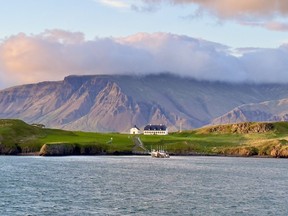The journey was marked by dramatic volcanic landscapes and magnificent waterfalls

Reviews and recommendations are unbiased and products are independently selected. Postmedia may earn an affiliate commission from purchases made through links on this page.
The tiny village of Geiranger, Norway is best known for its stunning views of Geirangerfjord and its proximity to the Seven Sisters waterfalls. It’s also a UNESCO World Heritage Site and is the third biggest cruise ship port in Norway.
But on the day we visit, it is famous for another reason. The community is soon to be the wedding destination for Norway’s controversial Princess Martha Louise and her even more controversial fiancé Durek Verrett, a self-proclaimed shaman from California.
To say the village is abuzz would be an understatement. I try not to take it personally as I am, you know, already there and thinking I am somewhat important. But, whatever.
After a few minutes in port, it’s not hard to see why the royal(ish) wedding is happening in the tiny village, which off-season has only a couple of hundred year-round residents.

Taking a bus tour up a winding road from the port, we twist and turn and twist and turn and twist and turn (there are 11 hairpin turns in total) as we make our way up a narrow mountain road to an overlook known as Eagle’s Bend, offering a most magnificent view of the deep blue fiord from 2,000 feet about the village. It is truly the stuff that dreams (and weddings) are made of.

Geiranger was just one fantastic stop on a 13-day Scandinavian-themed sailing aboard Viking Cruises’ hot-off-the-shipyard oceangoing Saturn that started in Reykjavik, Iceland and would end in Bergen, Norway with a stop along the way at the Faroe Islands, famous for having more sheep than people. Given the cruise line’s sleek Scandinavian esthetic and affinity for Nordic spas on their ocean-going vessels, sailing the northern waters seems well suited to the company’s interests.
Thanks to up to 200 days of rain a year and abundant snow in the winter, the west coast of Norway is lush and green and full of Alpine grandeur as far as the eye can see.
Iceland, our starting point, is not. Contrary to its name, the country is very green in places, but it is not blessed with many trees. As a bus guide jokes, if you’re lost in Iceland and want to be found, just stand up.
But what it lacks for in tall greenery, the country makes up for in dramatic volcanic landscapes, waterfalls and the geothermal hot springs that it has become most famous for.

Our journey starts in the capital city of Reykjavik and our ship, which carries just under 1,000 passengers, is docked about four kilometres from the downtown core. If you ever find yourself getting off a cruise ship there, be sure to walk at least one way to or from the Harpa Concert Hall if you can (otherwise free shuttle buses will get you there), as there is a beautiful, paved path called the Sculpture and Shore Walk to follow into town.
Along with seeing oft-photographed sculptures like the Sun Voyager Viking ship, closer to the cruise port is a well-marked eclectic home called the Recycled House, with the grounds full of folk art made of, well, recycled items. A sign also informs us the home belongs to the director of the “legendary feature” The Raven Flies. Must add that to the Netflix queue.
Exploring Reykjavik on foot is quite easy and it’s also a good launching point for outings to thermal spas the Blue Lagoon or Sky Lagoon.
While Reykjavik is fun, I found the smaller communities of Isafjordur, Akureyri and Seydisfjordur equally as engaging for their uniqueness and isolation on the large island. Our stops on our Icelandic coastal tour took in magnificent waterfalls, such as Waterfall of the Gods at Godafoss near Akureyri, which was Niagara Falls without the crowds.

Of course, a visit to Iceland would be incomplete without a trip to a geothermally heated spa and we took advantage of our proximity to Myvatn Nature Baths near Akureyri to get our soak on in pools surrounded by lava rocks.
In Isafjordur, we hopped on a bus to go to check out an abandoned farm and fishing village, featuring local photogenic fisherman Johann Hannibalsson dressed in traditional garb. Hannibalsson pulls off the look so well that he has been featured in tourism ads, which explains why he so convincingly strikes a reflective pose for the gathered tourists.
Our last stop in Iceland was the tiny eastern community of Seydisfjordur, with charmingly coloured buildings, the seemingly ubiquitous (but never unwelcome) rainbow sidewalk and a touchingly warm welcome by the community with local delicacies and entertainment.
Heading west, we spent a fantastic day on the gorgeous Faroe Islands (remember: lots of sheep, fewer people), where we watched the weather change by the minute but never dulling the green, green grasses of the Danish country and its sod-covered buildings (including a prison, which during our visit had eight guests).

Although it was Sunday when we hit port in Torshavn, we found a few local shops open to find treasures or treats to take home.
The fabulous cruise concluded in Norway, where we toured other wedding-worthy venues in Flam at the end of the breathtaking Aurlandsfjord, Alesund, renowned for art nouveau architecture built following a devastating fire in 1904, and Bergen, which greets you with the historic wooden buildings of the UNESCO-listed Bryggen Wharf.

During a great bike tour in Bergen, we got up into the hills of the city, also reachable by a funicular, to see the colourful buildings and port spread out beneath us.
What a great spot to say I do.